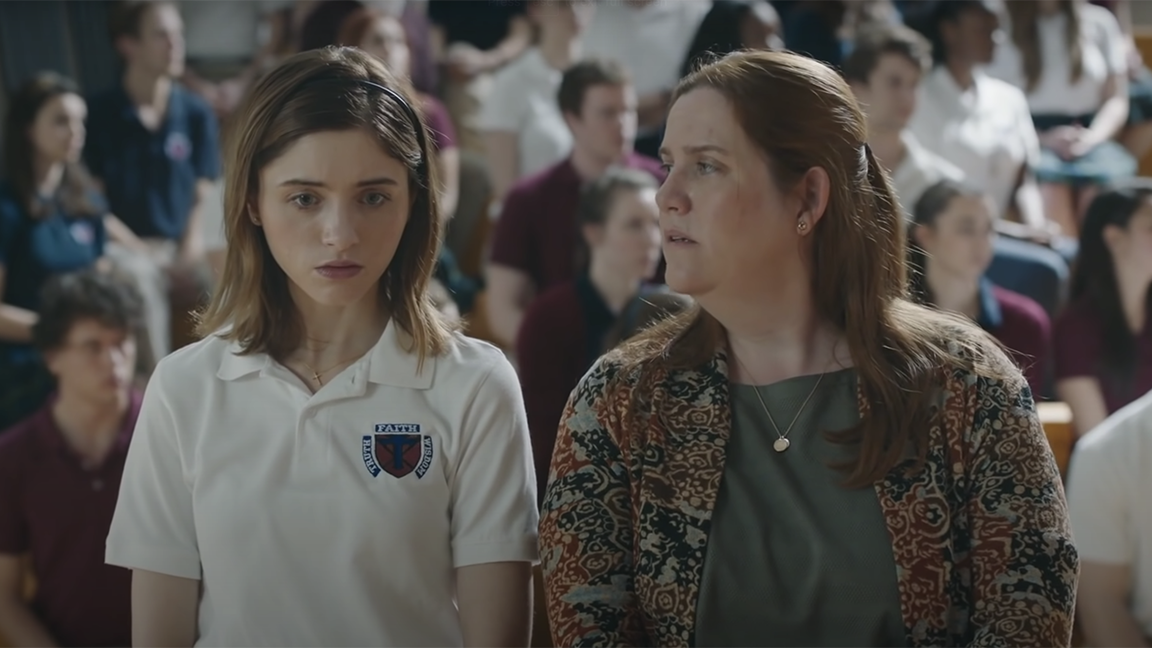In my nine years of Catholic school, I went to a few religious retreats I wasn’t keen on attending. I usually felt uninspired, drowsy and like I wasn’t really getting it. And now, the film Yes, God, Yes has managed to capture that dreary feeling of a retreat your parents forced you to go on.
In the movie, Alice (Natalia Dyer) attends a retreat hosted by her Catholic high school on her own accord. Well, OK — her attendance might have been influenced by the false, vulgar rumors about her tossing her classmate Wade’s salad. But it was also an attempt to control her newfound sexual urges.
The “Kirkos” retreat has a hint of mystique when Alice first hears of it. Her classmate even says she can’t talk about it with students who haven’t been. Pair that intrigue with the special necklaces past attendees get to wear — who wouldn’t want to give it a try?
Besides this air of exclusivity, it’s shortly revealed that Kirkos is much like the retreats of my past. The students are taken to a recreation center in the woods. Besides the occasional cross artwork on the walls or nutritional information in the cafeteria, it’s a pretty bland space. They partake in simple exercises, mostly just sharing sad stories but in a variety of seating arrangements and small groups. And to top it all off, the film has a dull color scheme with low saturation.
[Everything you need to know going into season two of ‘The Mandalorian’]
All of these components worked to manufacture that mundane space of an unremarkable retreat. Most of the editing was toned down, with limited jump cuts so most of the camera shots were sustained for a severely long time. It was just enough time to evoke feelings of unease with the stale environment. In transitional scenes, viewers are met with the uniform nature of ordinary suburban homes.
I liked the stripped-down approach of the editing and scenery in this film. It was a noticeable contrast to Alice’s curious coming-of-age. It translated the agony of her sexual repression with a muted, sullen surrounding. It sent the message that if her impure urges were to be revealed somehow, they’d stand out immediately.
Alice comes off as an outcast, thanks to this portrayal of the retreat. In one scene, the students all take turns sharing their trauma. One student talks about her grandmother’s recent passing, while another details how he was dumped over the phone. Alice can’t think of anything, so she makes up her pet dog’s death. I was the only one at my eighth-grade confirmation retreat who didn’t cry during a special time of reflection. I even felt the need to fake tears at one point. It’s super easy to feel like you’re missing out on this “epiphany” many appear to experience on a retreat. And Dyer plays that confused outcast role well.
There’s also a distinction between background music in key scenes. For a majority of the film, you’re greeted with the sounds of religious music. But when Alice experiences a moment of temptation, there’s a catchy, early 2000s pop hit playing. A cover of Christina Aguilera’s “Genie in a Bottle” blares as Alice is mesmerized by the macho arm hair of retreat leader Chris. It served as a subtle nod to the time this film took place, while also showing how Alice felt in these moments.
[Review: Aaron Sorkin crafts an entertaining, timely film with ‘The Trial of the Chicago 7’]
The film didn’t lean on indicators that it took place in the year 2000. And I’m glad it didn’t — relying on decade-specific gimmicks would’ve reduced its understated nature. I love ’90s and 2000s pop culture as much as (if not more than) the next person, but I’ve noticed a tendency in certain movies to hit you over the head with these references.
Take The To Do List, for example. I couldn’t help but compare the film starring Aubrey Plaza to Yes, God, Yes, because both works tackle a teenager’s sexual coming of age in a way. The film with Plaza felt more like a movie about the ’90s with its never-ending references. However, Yes, God, Yes doesn’t pull from the central theme, because it hints at its setting in more tasteful ways.
It makes an earnest attempt at the classic, albeit overused, trope of sexually repressed teenagers. The inclusion of “Catholic guilt” — which I have worked to eliminate from my own coming-of-age story — added depth to the plot. It’s not always these outrageous urges that appear in over-the-top dream sequences. It’s understated and shameful.
I’d argue we don’t need more variations of this storyline in future cinema, but this film succeeded in portraying the unfiltered, awkward nature of coming to terms not only with sexuality, but the looming Catholic guilt that comes along with it.



